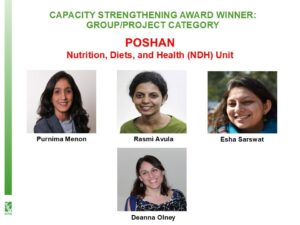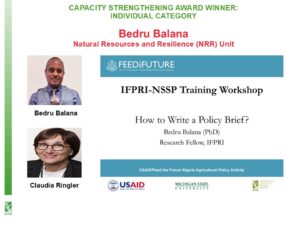To encourage IFPRI colleagues to continue to strengthen capacity of stakeholders, the Capacity Strengthening Program of the Development Strategy and Governance Unit, in collaboration with the Human Resources and CPA Divisions, presented two Capacity Strengthening Awards for the most impactful capacity strengthening activities conducted by IFPRI staff this year at RISE 2024.
Award Categories and Nominations
This year two awards were presented under the following categories- i) group/project level effort; ii) individual effort.
Under the group/project level effort, the following nominations were received:
- Partnerships and Opportunities to Strengthen and Harmonize Actions for Nutrition in India (POSHAN)
- Women’s Empowerment in Agrifood Governance (WEAGov)
- Tajikistan Evaluation and Analysis Activity (TEAA)
- Feed the Future Myanmar Agrifood Program for Strategy and Analysis (MAPSA)
Under the individual level effort, the following nominations were received:
- Bedru Balana, NRR
- Vartika Singh, NRR
Selection Committee and Criteria
The Selection Committee included Carlo Azzarri, Karl Pauw, Monica Dourado, Nicholas Minot, Rasmi Avula, and Samuel Benin.
The selection criteria elements were:
- Relevance and importance of content
- Scope for long term impact
- Evaluation/feedback from participants
- Proof that the training has been socialized in the Global South
Award (s)
i) group/project level effort: POSHAN
The POSHAN team collaborated with Lal Bahadur Shastri National Academy of Administration (LBSNAA), a premier training institution for the civil services in India under the Department of Personnel & Training, Government of India, on developing and hosting short courses to promote the understanding and capacity of policymakers and administrators on nutrition and nutrition-related policies and programs in the country. The course aligned with the mandate of India’s National Nutrition Mission (NNM), which aims to create a synergy between the various schemes affecting the nutritional status of children and pregnant & lactating women and focus the action at district level. The course, therefore, focused on the backbone of the mission, the district administrators. The approach followed was to build the capacity of the administrators around the fundamentals of nutrition and then let them explore the data available for their own district/state, which helped them to identify the problem and move toward a set of solutions. The training material can be accessed here.
ii) individual level effort: Bedru Balana, NRR
Bedru Balana delivered ‘Policy Brief Writing’ trainings to participants selected from the Federal and State Ministries of Agriculture including Commissioners, Permanent Secretaries, Directors, Deputy Directors, Heads of PRSs and other Senior experts in Nigeria. The key topics covered in the seminars include: Conceptualizing a Policy Brief (What is it?); Why a Policy Brief? Structure of a Policy Brief (How to Write)? Key Features of a good Policy Brief? Types of policy brief? & Functions of Policy Briefs? Reading materials, power point presentation and audio records of the seminar were shared with the participants. He also worked closely and mentored staff members of various local partners (private, public, and academic institutions), for instance, Crop2Cash Ltd. (private sector), Environmental Care Foundation (ECF), and Kano University of Science and Technology (KUST) on technical/funding proposal writing, project management, donor reporting etc. He trained more than 100 enumerators on survey protocols, survey administration, and data management. The training material can be accessed here.